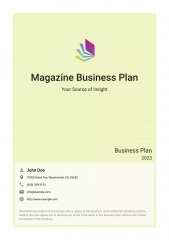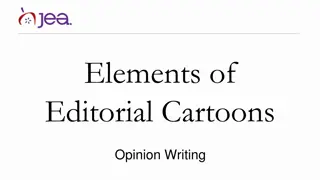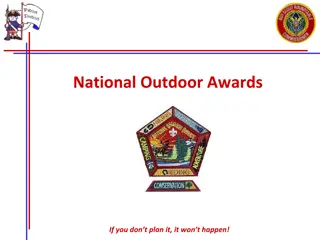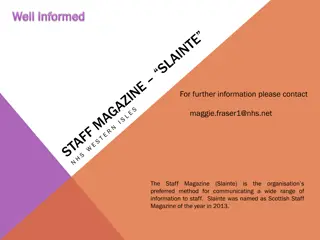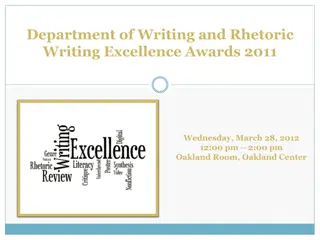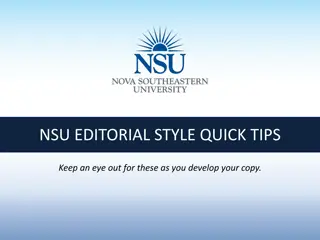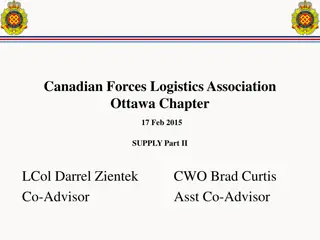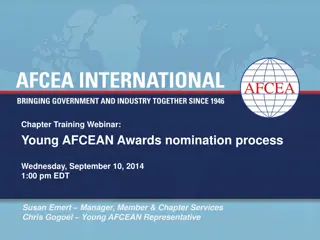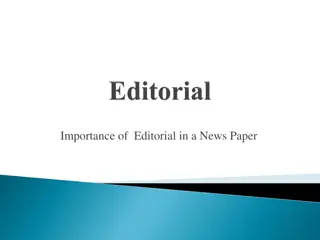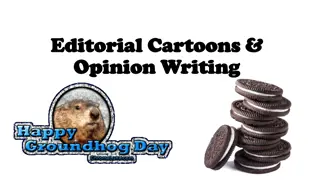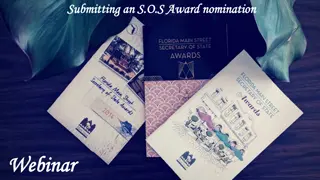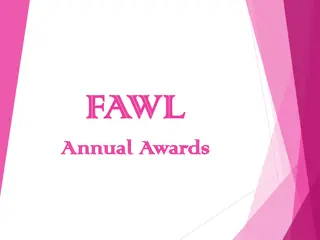2010 Western Magazine Awards: Recognizing Excellence in Western Canadian Editorial Work
The 2010 Western Magazine Awards Foundation honored outstanding contributions in writing, design, and photography, with Timothy Taylor winning the Gold Award for Best Article in the B.C./Yukon region. Vancouver Review emerged as a key player in the literary and arts scene, showcasing a critical perspective on Vancouver's food culture. The event highlighted top finalists and the overall winner in various categories, celebrating excellence in Western Canadian editorial work.
Download Presentation

Please find below an Image/Link to download the presentation.
The content on the website is provided AS IS for your information and personal use only. It may not be sold, licensed, or shared on other websites without obtaining consent from the author.If you encounter any issues during the download, it is possible that the publisher has removed the file from their server.
You are allowed to download the files provided on this website for personal or commercial use, subject to the condition that they are used lawfully. All files are the property of their respective owners.
The content on the website is provided AS IS for your information and personal use only. It may not be sold, licensed, or shared on other websites without obtaining consent from the author.
E N D
Presentation Transcript
The Western Magazine Awards Foundation The Magazine School 2010 Bringing outstanding writing, design and photography to the classroom
Western Magazine Awards Foundation An annual awards program recognizing excellence in Western Canadian editorial work, and design. westernmagazineawards.ca TMS The Magazine School is a project of the Western Magazine Awards Foundation. It provides classroom material to writing and design instructors and professors.
The 2010 Western Magazine Awards Gold Award Best Article B.C./Yukon Foodville: Part One Timothy Taylor Vancouver Review
Finalists: Gold Award - Best Article, B.C./Yukon Gary Mason, Never Say Quit, BCBusiness Jim Sutherland, Lights Out, BCBusiness Tyee Bridge, Managed to Fail, BCBusiness Lee Henderson, Our Lady of the Zombies: The Art of Aurel Schmidt, Border Crossings Frances Bula, The Ecstasy of Paul Haden, Vancouver Magazine Timothy Taylor, Foodville: Part One, Vancouver Review Trevor Boddy, Vision Deficit, Vancouver Review
And the winner is Timothy Taylor Foodville: Part One Vancouver Review Awards: Gold Award, Article B.C./Yukon (sponsored by the B.C. Ministry of Tourism, Culture and the Arts) Arts, Culture and Entertainment category (sponsored by British Columbia Association of Magazine Publishers)
Vancouver Review The Vancouver Review is a spicy, take-no-prisoners, Canadian, West Coast magazine for literature and the arts Published by the Vancouver Review Publication Society, a non-profit society with charitable status Circulation: 2,500 On newsstands for $4.95 Subscription: $16 per year vancouverreview.com
How the story came to be Timothy Taylor was interviewing Vancouver Review editor Gudrun Will for the Globe and Mail Taylor said he wanted to write about food culture in Vancouver from a critical perspective. Will said, That s one aspect of culture we haven t covered.
Meet the author: Timothy Taylor Vancouver author and journalist Contributing editor at EnRoute and Vancouver Magazine He is the author of two novels and a short fiction collection. timothytaylor.ca/about Foodville: timothytaylor.ca/09/05/05/foo dville-part-one-welcome-food- fashion-era
Brainstorming the idea Taylor s first novel was Stanley Park, which was set in a restaurant. Timothy cooked his way through the cookbooks of the masters, page by page, and he is obviously a very methodical guy who is clearly obsessed with food. We planned out a three-part series. Gudrun Will, editor of Vancouver Review
Critiquing the overblown Vancouver food scene We gave him a lot of freedom. We wanted to pop the balloon of the sort of idea Vancouver had of itself, and its sophistication in food culture struck us both as rather overblown. So the first piece was really popping that balloon. Gudrun Will
Foodville: Part One 6,000 words Vancouver Review is one of the few places doing long-form journalism in Canada and they are really open to the long, meaty essay. Timothy Taylor timothytaylor.ca/09/05/05/foodville-part-one- welcome-food-fashion-era
Timothy Taylor on story development Taylor on using the first-person point of view: I am somewhat identified with food because of my novel Stanley Park so I had enough authority, I thought, to carry that. The evolution of focusing on criticism: It was a surprise to me it ended up being about criticism so much.
Researching the gushing I remember there were certain critics who I decided to leave nameless and I remember how much I hated their writing. Sitting in the library I was forced to think about the significance of Vancouver food critics [who] just gushed for a decade and a half, that s what they did. So that s when the story began to shape itself; let s talk about criticism. Timothy Taylor
Using death to enter food pomposity Taylor recalls: Chefs had killed themselves as a result of bad criticism and it suggests this great power the critics had. Then, much to my astonishment, I came across this (Pittsburgh) critic who had killed himself: Mike Kalina. So the story about criticism really started to take shape.
Getting to the bottom of the food fashion era It is impulse to copy what is going on in other restaurants and trump them. That s what makes something a fashion-driven phenomenon in my view. Timothy Taylor
How to critique the critics? The biggest thing was how to do it without being a jerk. I don t really want to hurt anyone s feelings. I wanted to have Vancouverites who like food read this and go yep, that s my city, alright. Timothy Taylor
Consider the lead Not many people will remember the story of Pittsburgh food critic Mike Kalina. But, as strange as it may seem, I think we should remember him.
Food critic outed But food critics? Whoever heard of a critic killing himself? And while the truth about Kalina may never be known, strong evidence suggests that his suicide was professionally motivated. Specifically . . . that he had been paid money by restaurants for positive reviews.
Foodville: Part One had 10 Sections 1. Opening: Focus on Mike Kalina, the critic who killed himself Focus on Vancouver: . . . more than any other city I ve visited or lived in, cherishes the legend of its own culinary prowess. 2. Hyberbole of restaurant critique The story of British Columbia s climb to culinary stardom is written in the constellations . . . 3. Why did we all get so hopped up about food?
Foodville: Section 4 to 6 4. Author works his way through Jacques Pepin cookbooks Sets 1992 as the era of fashion food 5. Names James Barber the patron saint of critics It s simple and delicious. So quit being such a snob. 6. Discusses critics In the end, each critic is a flavour, a dish on the menu that readers choose based on mood and taste.
Foodville: Section 7 to 8 7. Introduces chef Rob Feenie. . . . ratte pototoes and Perigod truffles with cauliflower puree, spinach, foie gras emulsion and red wine beef jus. 8. What does fashion food get us? Experimentation, which can be a good thing
Section 9: The author as critic Eats out at West Restaurant But flavour? In each case, I regret to say we were underwhelmed. The tiny coil of pork belly on my plate was tasty. The rest was a bit pale. The sweetbreads scored, but the smoked tongue was overcooked, very dry. The crispy veal garnish was crisp to the point that its only flavour was crispness. It could have been filaments of pork rind. My friend who ordered the venison said he wished he d ordered the calamari ravioli appetizer again as a main course. And the chicken order fared even worse.
Section 9: The author as critic (contd) Author not transcended for $500 So, West. A transcendent experience? I just can t agree, and we sampled half the menu. Fun, certainly. We enjoyed ourselves. The service is great. The room is lively and attractive, although the duodenal mirror-sculpture thing on the ceiling has to go. But when I m out with friends, I want to eat and talk and get full and taste stuff. Perhaps West is too subtle for me. And I m guessing that, after dropping $500 for a party of four, a lot of people will find the West experience too subtle. Unless, that is, they derive significant value from the fact of their presence at the epicentre of Vancouver culinary fashion, and the momentary convergence of their own behavior with that of Vancouver s food critics.
Section 10: Full circle ending You just eat the thing. Talk to your companion. Don t think about Mike Kalina. In fact, pretend there isn t a food critic in the world. Except Barber, maybe, whose 14 syllables may be muttered under the breath from time to time, an incantation to be invoked after catching your reflection in any restaurant mirror. It s simple and delicious. So quit being such a snob.
Story visuals Illustrator: Roxanna Bikadoroff She has creative freedom, we don t tell her what to draw. Gudrun Will, editor of Vancouver Review
Credits The Magazine School is a project of the Western Magazine Awards Foundation, which acknowledges the financial support of the Government of Canada through the Canada Periodical Fund of the Department of Canadian Heritage toward project costs. The Magazine School content was prepared with the skilful assistance of Janice Paskey and students Sarah Kitteringham and Terence Yung of Mount Royal University, and with the generous co-operation of the winners of the 2010 Western Magazine Awards. We acknowledge the financial support of the Government of Canada through the Canada Periodical Fund (CPF) of the Department of Canadian Heritage towards our project costs.


